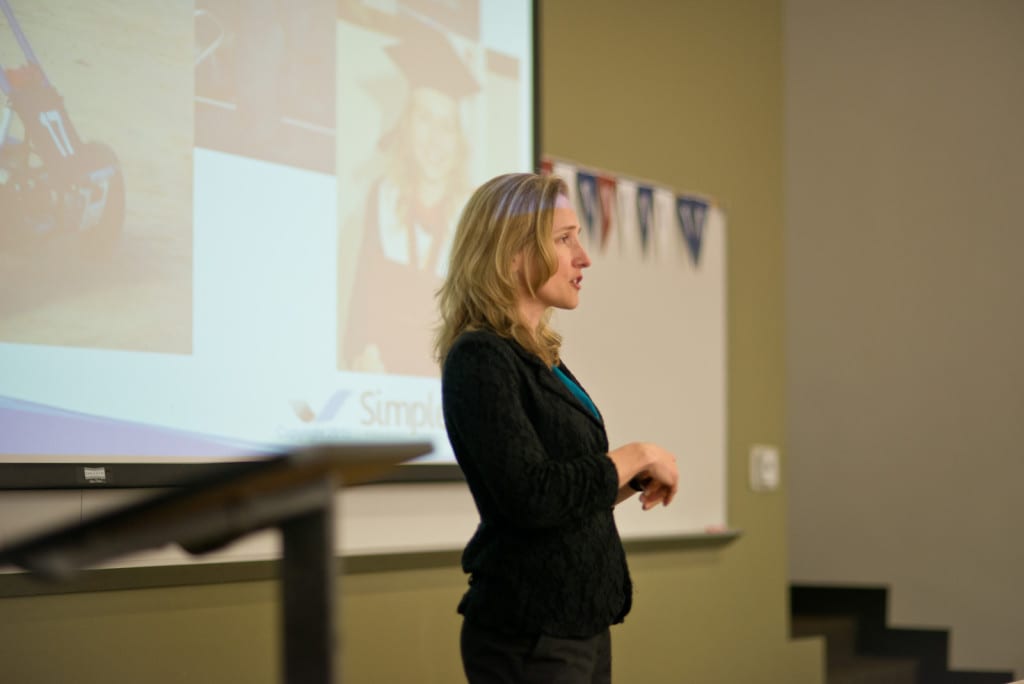
Speaking to students in March 2015, Loyola Marymount University alumna Dorota Shortell ’98, discussed the concepts behind success, encouraging students to define the term for themselves.
Shortell’s educational and professional biography exemplifies most people’s definition of success. After accepting LMU’s offer to enroll in the Honors Program, Dorota graduated as University Scholar of the Year, receiving both the Marian Award and Presidential Citation. She went on to receive her second degree in mechanical engineering, this time a Master’s degree from Stanford University. She began her engineering career and quickly worked her way up to project manager.
Yet the road to Shortell’s professional success was not direct. While she is currently president of the engineering design firm Simplexity Product Development, overseeing a multitude of projects, she and her husband made many personal decisions that affected her path.
“Is this success?” Shortell asked the audience, referring to her presidency. “For me, this alone was not enough.” She explained that her career path developed because of three important life choices she made.
Partnership With Her Husband
Shortell explained how support and sacrifice have played important roles in her relationship with her husband, Christopher Shortell, Ph.D. (Liberal Arts ’97). He supported her when she attended graduate school in Palo Alto, abandoning his acting pursuits and accepting a position he may not otherwise have chosen.
When her husband wanted to pursue graduate school, she supported his decision; they moved to San Diego. Later, they moved to Los Angeles so Shortell’s husband could accept a professional offer. At the time, Shortell was climbing the corporate ladder and managing the company’s biggest project in their San Diego office. “It was not about money and my career,” Shortell said.
Having Children
When the couple decided to have children, they decided to tag-team and manage atypical work schedules rather than hire nannies or pursue daycare. Shortell acknowledged there is more than one right answer and respects others’ choices.
Later, Shortell left her job altogether to raise her family, working only part-time at LMU as an instructor of graduate courses in Los Angeles. “Having a family is not easy,” reflected Shortell. “I didn’t know if I was going to get a job after that,” referring to her choice to leave the corporate work force.
Opting for a Better Quality of Life
In 2008, the family made a particularly difficult decision. They relocated to Portland so Shortell’s husband could accept a tenure-track position at Portland State University. Though Shortell’s job situation was uncertain, “we made this decision because of our children,” she said. “We could have a better quality of life in Portland, with a home and good schools in a nice neighborhood.” She made these decisions because they reflected her and her husband’s definition of success. “Success is not an end point, but an ongoing goal for me,” Shortell said.
Notably, Shortell pointed out similarities between the values of LMU and that of her company: LMU’s value of academic excellence and Simplexity’s value of product development excellence; LMU’s commitment to students (part of what brought her to the University) and Simplexity’s commitment to employee well-being.
At the conclusion of her talk, Shortell asked students to contemplate their own definition of success and encouraged them to reflect on it when considering employment opportunities. She encouraged students to seek opportunities at companies that reflect the students’ values.
Dorota Shortell’s talk was delivered as part of the Seaver Spotlight lecture series, organized by the Center for Student Success.




